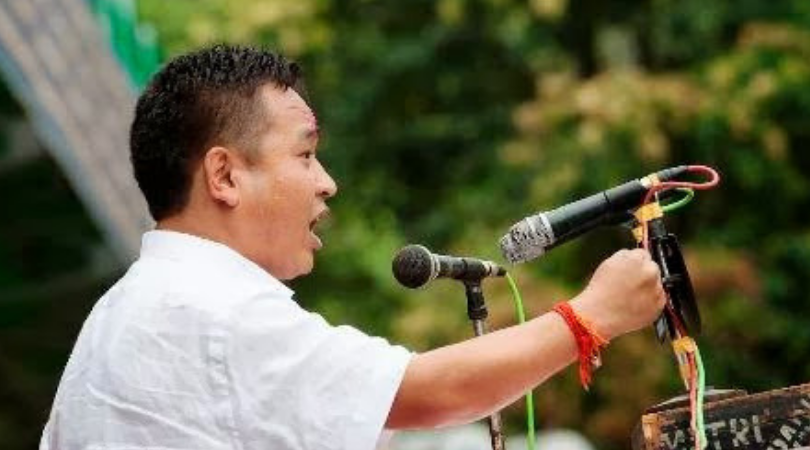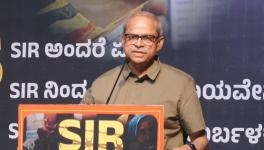Can a Former Convict Contest an Election?

With barely a few months before India votes in the Lok Sabha elections, an electoral issue has struck Sikkim. Sikkim is one of the few states where the assembly elections are in sync with the Lok Sabha elections, hence, the issues at the time of election tend to remain state-specific. The issue here is whether Prem Singh Tamang (Golay) is eligible to contest the elections or not.
Golay, who appeared as the primary opposition to Pawan Kumar Chamling in the 2014 elections, had rebelled against the Sikkim Democratic Front (SDF) in 2009 when he was the minister for Building and Housing Department. In 2013, he launched the Sikkim Krantikari Morcha (SKM). However, in December 2016, he was convicted with simple imprisonment by a sessions court for offences under the Indian Penal Code and the Prevention of Corruption Act when he was the minister for Animal Husbandry, Ecclesiastical and Industry Department in the SDF government between 1994 and 1999. His sentence ended on August 10, 2018 after serving one year behind bars.
Also Read | Ahead of 2019 Polls, Demands for NRC and ILP in Sikkim
Representation of the People Act, 1951
In 2002, the Representation of the People Act was amended thrice. The first Amendment added additional grounds for disqualification under section 8 of the Act. The three grounds for disqualification were: conviction for offences under the Commission of Sati (Prevention) Act, Prevention of Corruption Act, and the Prevention of Terrorism Act. The section was also amended so that a person convicted under the provisions of the laws listed would be ineligible to contest an election for a period of six years upon completing a sentence of imprisonment, and in case of a fine, from the date on which the fine is paid.
The second amendment Act pertained only to the representative bodies in Bihar. The third Amendment introduced duties on the candidates to furnish information regarding whether they have been accused or convicted for any of the offences mentioned under section 8. The amendment also introduced Chapter VII which deals with members of parliament mandatorily declaring their assets and liabilities within 90 days of joining a house.
Also Read | SC: Widely Publicise Criminal Antecedents of Candidates
The Sikkim Controversy
Thus, it would appear that Golay cannot contest the election as it has been less than a year since he completed his sentence. However, the matter gets complicated since in 2015, parliament passed The Repealing and Amending Act, 2015 through which the three mentioned amendments to the Representation of the People Act were repealed in their entirety. This has become the basis on which the SKM has declared that Golay can contest the elections. Rinzing Tamang, an advocate and a member of the SKM told the Sikkim Chronicle that the party had submitted an application under the Right to Information Act to the Union Ministry of Law and Justice on this issue. The Ministry responded by mentioning the Repealing and Amending Act, 2015. Hence, on the basis of the Ministry’s response, the entire basis for Golay’s disqualification does not arise.
The ruling SDF however, through a press statement issued on February 2, 2019, mentioned some of the issues in the SKM’s position. Firstly, the Repealing and Amending Act, 2015 under section 4 states that:
“The repeal by this Act of any enactment shall not affect any Act in which such enactment has been applied, incorporated or referred to ... nor shall this Act affect any principle or rule of law, or established jurisdiction, form or course of pleading, practice or procedure,or existing usage, custom, privilege, restriction, exemption, office or appointment, notwithstanding that the same respectively may have been in any manner affirmed, recognised or derived by, in or from any enactment hereby repealed ...”
Also Read | Barring Former Convicts from Political Participation
This, however, boils down to a matter of interpretation. If the Repealing and Amending Act, 2015 repealed the 2002 Amendment Acts to the Representation of the People Act, then it should follow that those amendments in the principal Act also stand repealed. However, Section 4 of the Repealing and Amending Act states that the repeal of the Acts mentioned will not affect the principal Acts. Hence, it would appear that the purpose of the repeal is not to do away with a particular amendment, but rather to lighten the existing large inventory of legislations.
The Larger Picture
Whether Golay can contest or not is best left to the Election Commission of India to decide. However, this particular situation poses bigger questions. Should a person who has served a sentence continue to be punished by a limitation on their rights as citizens? Another is whether a person who has been convicted for non-political serious offences be allowed to occupy public office? These questions ought to be pondered over, whether by the people of Sikkim, or India as a whole.
Get the latest reports & analysis with people's perspective on Protests, movements & deep analytical videos, discussions of the current affairs in your Telegram app. Subscribe to NewsClick's Telegram channel & get Real-Time updates on stories, as they get published on our website.
























